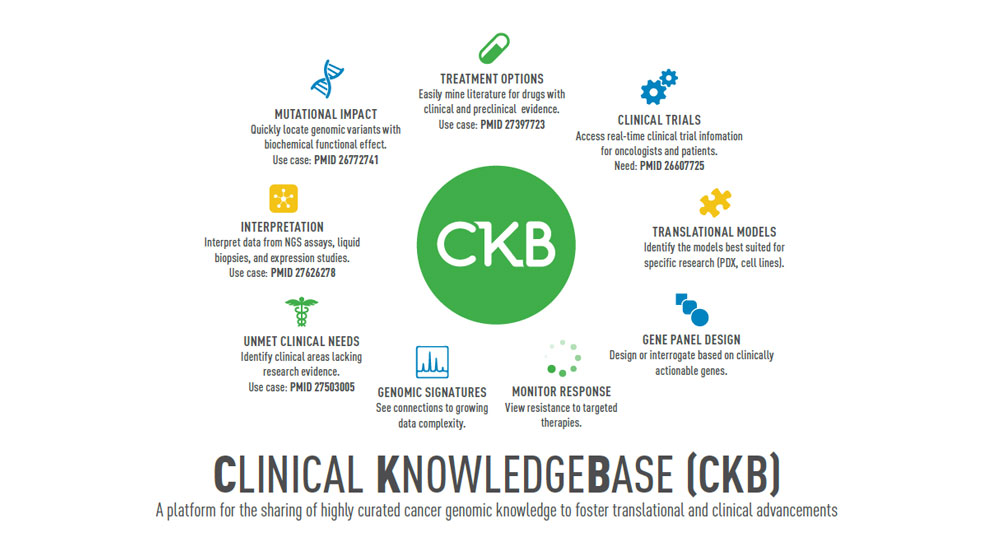
There are approximately 1,735,350 new cancer cases diagnosed each year in the United States. To combat this, precision oncology care has advanced the treatment options available for patients, making a marked difference in both lifespan and quality of life for many with cancer. However, in order for translational researchers to build off each other’s most promising and current studies and for clinicians to find the most impactful treatments for their patients, there must be effective cancer genomic knowledge-sharing. The Jackson Laboratory’s Clinical Knowledge Database (CKB) is dedicated to addressing this need.
CKB represents a dynamic, digital encyclopedia with sophisticated search capabilities that allow both researchers and clinicians to interpret complex cancer genomic profiles. Since the program’s launch in 2016, CKB has been used by more than 36,000 unique users from 122 countries, and had nearly 700,000 page views. CKB has now been improved to also provide information on tumor mutational burden and microsatellite instability, in addition to protein expression profiles, structural variations, and somatic gene variants.
“As cancer researchers, we understand that every day is precious in the search for tomorrow’s cures, and having the best tools is a key factor in making those groundbreaking discoveries that may one day save the lives of our loved ones and friends,” said Charles Lee, Ph.D., FACMGThe study of structural genomic variation in human biology, evolution and disease.Charles Lee, Ph.D., FACMG, scientific director and professor at JAX. “Our colleagues at JAX’s use this platform to help clinicians find the best treatment options for their patients. We are thrilled to be able to share this important resource to change treatment outcomes and advance cancer research around the world.”
To provide structure for precision oncology knowledge, which was previously scattered in tens of millions of publications, CKB utilizes controlled vocabularies and ontologies, and has begun to integrate text-mining and machine learning technologies to ensure a scalable knowledgebase. CKB provides data that are updated daily, saving valuable time for oncology professionals. By bringing together translational research findings to clinicians, CKB provides the most up-to-date data for cancer patients.
This month, The Jackson Laboratory introduced a new tiered structure, making CKB more accessible than ever. Clinicians, translational researchers, academics, clinical lab personnel, and even patients may choose between three levels of access to best suit their needs. CKB CoreTM provides free access to 86 of the most highly actionable genes, CKB BoostTM, the newest option, provides web- access only to 1,000+ genes, while CKB FlexTM provides scalable and flexible content integration into bioinformatic workflows for these 1,000+ genes.
All three versions of JAX-CKB provide the following services, and information about:
- Treatment options based on genomic mutational profile
- Ongoing clinical trials that patients can enroll in
- Translational models
- Gene panel design
- Monitoring response
- Genomic signatures
- Unmet clinical needs
- Data interpretation
- Mutational impact
The CKB CoreTM, CKB FlexTM, and CKB BoostTM are all available now. To learn more about CKB, powered by The Jackson Laboratory, please visit https://ckbhome.jax.org.
The Jackson Laboratory is an independent, nonprofit biomedical research institution based in Bar Harbor, Maine, with a National Cancer Institute-designated Cancer Center, a facility in Sacramento, Calif., and a genomic medicine institute in Farmington, Conn. It employs 2,200 staff, and its mission is to discover precise genomic solutions for disease and empower the global biomedical community in the shared quest to improve human health. For more information, please visit www.jax.org.;